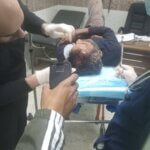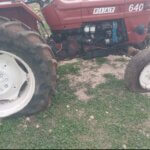Travelling in the Jordan Valley – water is illegal
By our new volunteers from France and Scotland
Travelling in the Jordan Valley is some thing different. It’s the traditional way of Jordan Valley Solidarity resistance: Being with people of the Jordan valley all the time, staying with them, listening to their stories, challenging the occupation …learning from them that To Exist is to Resist.
Our first visit was to north of the valley, starting at about 3 o’clock in the evening with one French, three Scottish. and one Palestinian volunteer. We were told by our Palestenine friend that the Israeli Occupation Force (IOF) had confiscated four water tanks and a tractor to prevent Bedouins from bringing water to theie families – it seemed like a very strange story to us …
On our way to see them we stooped to visit another bedouin family who were living near the road. We were told that this was Al Maleh area, and that we had stopped at Ein El Hilwe village. We could see the water pipes going up the hill to the nearly settlement (Maskiyyot), but it was clear that there was no water pipe coming to this community. There was an electricity column near the makeshift tents that were home to the families there, but they had no acces to the electricity. All these services follow a new road going up the hill to the rows of new buildings that we could see were still being constructed.
We listened to a local man with his young children and wife, as they spoke to us about the occupation and the settlers in the nearby colony on the top of the hill – Maskiyyot. We heard about how this settlement was for settlers who had run away from Gaza, how they came to the valley stealing the land and water, stealing animals and beating the children, calling the army and police to arrest the Bedouinn. Qadri Daragmeh and his wife talked about how the settlers had killed the horse of their son.We promised to come back to the family to listen to their story after we had a sweet tea with the children in the school.
As we said before – going to people, being with them, listening to them, and learning their story is part of how Jordan Valley Solidarity works to support them.
We decided to follow the story, and in a very old car travelled over a dirt track for more than 30 minutes until we arrived at a big agricultural area. Qadri pointed to a lot of blue barrels. We walked over to discover that water had been tipped out of the barrels, and that the tent was lying on the ground. Qadri said: “This is how they transfer us. There is no need to kill us or arrested us, they just need to throw our water away and there will be no life ..the Bedouin will leave. There is no water .. no water ..no life”.
We took some pictures and keep following Qadri’s finger showing the driver where to go. In the middle of nowhere Qadri asked to stop. He called the young Shepherd (the only person we could see there) with a big Radio on his arm and a slim, brown face this young Bedouin man seemed quite shy. With a big smile on his face he said “Welcome” in English.
We talked to him and he told us that he is one 11 brothers and sisters, 3 of whom are studying at university. He is looking after the 120 sheep, which is the only way for the family to make a living, selling the cheese. He said: “It will be difficult for us to have good income this year. We can’t buy food for the animals. If they prevent us from bringing water here, that means we will not be able to bring our animal here to get free food from the mountain.”
After another 5 minutes of driving we came across an abandoned house at the top of a hill in the valley. It was obvious straight away that this was a family home – there was lots of corn out the back, bedding strewn around and the even the plants were still wet from being watered. However we soon found out the family who had once lived here, eaten this corn and watered these plants had been forced to leave their home just two days ago. The Israeli army had come and stolen their water tanks and without these the family had been unable to stay. Water is the Jordan Valley is so precious as the Palestinians who live here only have access to 2% of the land’s water, so Israel knows that if they take away this limited access to water then the Palestinians will have nothing to live on. Without their water tanks there is no other way for the family to access water- this means they have nothing to drink, to wash in, to feed their animals with or to grow their crops. By taking the water tanks the army took with them the families ability to survive and are left with no option but to leave the land they have lived in for generations.




